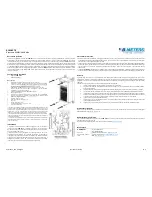
27
The pool heater touchpad, located on the upper front
panel of the heater, allows the user to select either
POOL or SPA operation, and to adjust the setpoint
temperature. The LCD display window indicates the
mode (OFF, SPA, POOL) and the actual water temper-
ature. A manual power switch provided below the
touchpad turns the control power ON or OFF.
Mode Button
The MODE button is used to select either POOL or
SPA operation. It also allows the user to turn the
heater off electronically, allowing the LCD display to
remain energized and to continue showing the actual
water temperature.
Temp Buttons
If the heater is in POOL or SPA mode, the desired
water temperature (SETPOINT) will also be displayed
and may be adjusted using the UP or DOWN buttons.
Operation
In the POOL or SPA modes, the actual water temper-
ature is displayed along with the desired water temper-
ature (SETPOINT). When the water temperature is
above the setpoint, “Water Temp” will alternate with
“No Demand.” When the water temperature is below
the setpoint and the heater is firing, “Water Temp” will
alternate with “Heating.”
To adjust the setpoint temperature, make sure the con-
trol is in the appropriate mode (POOL or SPA) and
push the UP or DOWN buttons.
Service Menu and Fault History
To access the Service Menu and fault history, press
the MODE and UP buttons simultaneously for 3 to 5
seconds. The heater will continue to operate normal-
ly while in the Service Menu. The first screen dis-
played is the Flame Strength indicator, which indicates
LCD Display
Temp Buttons
Mode Button
Program
button
ALTERNATING DISPLAYS DURING HEATING
FLAME STRENGTH INDICATOR
SUPPLY VOLTAGE INDICATOR
RUN TIME INDICATOR
Press the DOWN button. The Supply Voltage screen
indicates the voltage supplied to the control board.
Normal readings range from 24 to 29 volts.
Press the DOWN button. The Run Time indicates the
total hours of operation for the pool heater, as meas-
ured by the amount of time that the main gas valve has
been powered. The Cycle count indicates the number
of on/off cycles of the heater, as measured by the
number of times the pilot valve has been powered.
THERMOSTAT OPERATION - ADVANCED FLAME TECHNOLOGY (AFT) BOARD
the pilot flame current using a bar graph and numeri-
cal display. A signal of less than 4 indicates a weak
flame signal and may require service. Refer to Section
5 – Troubleshooting for possible causes and correc-
tions.
FAULT HISTORY
Press the DOWN button. The Fault History can dis-
play up to ten faults in memory. The order of the faults
begins with “Fault Last,” which is the most recent fault,
and proceeds through ten most recent messages in
chronological order. The second line of the display
shows the fault message. If there are no faults in the
history buffer, the second line reads “All Faults Clear.”
















































